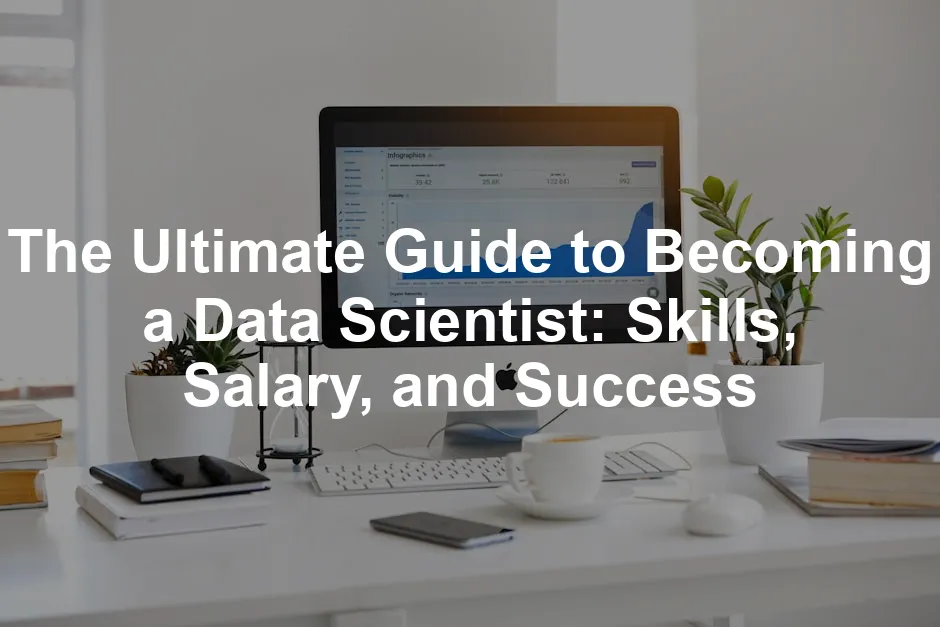Introduction
In a world where decisions are fueled by data, data scientists reign supreme. Often dubbed the “sexiest job of the 21st century,” this profession combines a unique mix of skills to transform raw data into meaningful insights. Imagine being the superhero of the digital realm—saving companies from poor decisions with the power of analytics!
So, what’s the secret sauce to becoming a data scientist? It’s more than just crunching numbers; it’s about weaving a story from data. From programming prowess to statistical wizardry, data scientists wear many hats. They don’t just analyze data—they predict trends, uncover patterns, and create models that help businesses soar.
As we venture deeper into this guide, we’ll break down the nuts and bolts of what it takes to be a data scientist. We’ll explore the responsibilities that come with the title, the skills you need to cultivate, the salary expectations, and the exciting career paths that await. Get ready to embark on a thrilling ride through the fascinating universe of data science!
Curious about the complexity of data? With the rise of social media, e-commerce, and digital transactions, a staggering 33 zettabytes of data are generated yearly. Companies leverage this data to make strategic decisions that can make or break their success.
The demand for data scientists is skyrocketing, and it’s not slowing down anytime soon. According to the US Bureau of Labor Statistics, data science careers are projected to grow by a jaw-dropping 36% over the next ten years. This means a treasure trove of opportunities awaits those who dare to enter this field.
Don’t worry if you’re feeling overwhelmed—this guide will clarify everything you need to know. By the end, you’ll be armed with knowledge about the role, the skills required, and the salary prospects, making you ready to tackle the data science world head-on. Buckle up, because your journey into the realm of data starts now!

Summary
This article highlights the multifaceted world of data science and the vital role of data scientists in modern organizations. Here are the key takeaways:
- Role Overview: Data scientists analyze complex datasets, identify patterns, and develop models to drive business decisions.
- Skills Required: Essential skills include programming languages (Python, R), statistical analysis, machine learning, and data visualization.
- Career Path: Various pathways into data science include degrees, certifications, and self-study. Internships can provide practical experience.
- Salary Insights: The average salary for data scientists varies by experience, location, and industry, with entry-level positions earning around $55,000 and experienced professionals exceeding $100,000.
- Job Market Trends: The demand for data scientists is expected to grow significantly, making it a lucrative career option with numerous opportunities across industries.
Curious how to break into this exciting field? Let’s dive deeper into the essential aspects of being a data scientist!

What is a Data Scientist?
Definition and Role
A data scientist is a modern-day wizard. They turn massive amounts of raw data into actionable insights. Think of them as the detectives of the data world, digging through heaps of information to find hidden treasures. Their role in an organization is pivotal. They collaborate with various departments to ensure that decisions are backed by solid data rather than mere hunches.
In today’s data-driven landscape, the significance of data cannot be overstated. Companies generate trillions of bytes of data every day, and data scientists harness this information to inform strategic decisions. Whether it’s driving marketing campaigns or optimizing supply chains, data is the fuel that powers progress. Organizations that effectively leverage data science often outperform their competitors. After all, who wouldn’t want to make decisions based on facts instead of guesswork?
Responsibilities of a Data Scientist
Data scientists juggle a variety of tasks. Let’s break down their key responsibilities:
- Data Cleaning and Preparation: Raw data is often messy. Data scientists spend a significant amount of time cleaning and organizing this data. They ensure that the information is accurate and usable. Think of it as tidying up a cluttered room before you can find what you need.
- Statistical Analysis and Modeling: Once the data is clean, it’s time for analysis. Data scientists employ statistical methods to identify trends and patterns. They build predictive models to forecast future outcomes based on historical data. Imagine trying to predict the weather—data scientists use similar techniques to forecast business trends.
- Data Visualization and Presentation of Findings: What good is data if it’s not presented clearly? Data scientists create visual representations of their findings, such as graphs and dashboards. These visuals help stakeholders easily understand complex information at a glance. A well-crafted chart can tell a story that numbers alone cannot.
- Collaboration with Other Departments: Data scientists do not work in isolation. They often collaborate with marketing, finance, and IT teams. By understanding the needs of different departments, they can tailor their analyses to provide the most relevant insights. This collaboration fosters a data-driven culture within the organization.
In summary, data scientists play a crucial role in shaping the future of their organizations. They transform raw data into insights that drive impactful decisions, making them indispensable in the modern business landscape.

Skills Required to Become a Data Scientist
Technical Skills
- Programming Languages: A substantial part of a data scientist’s toolkit includes programming languages. Python and R are the most popular choices. Python is loved for its simplicity and versatility, while R excels in statistical analysis. SQL, on the other hand, is essential for managing and querying databases. Mastering these languages is crucial for anyone looking to enter the field. If you’re just starting, you might want to grab a copy of Python Crash Course. It’s a great way to kickstart your programming journey!
- Statistical Analysis: Statistics is the backbone of data science. A strong foundation in statistical concepts is critical for interpreting data correctly. Data scientists use statistics to validate their findings and ensure that their conclusions are reliable.
- Machine Learning: The world of machine learning is vast and exciting. Data scientists use algorithms to automate data analysis and make predictions. Familiarity with various machine learning techniques, such as regression, classification, and clustering, is essential. These algorithms allow businesses to gain insights that were previously unimaginable. For a deeper dive into machine learning, consider reading Machine Learning Yearning by Andrew Ng.
Data science is not just about crunching numbers; it’s about combining technical skills with creativity and curiosity. Those who succeed in this field are not just number crunchers; they are storytellers who use data to create compelling narratives that inform business strategies.

Soft Skills
- Communication: Data scientists are like data translators. They transform complex findings into simple, relatable terms. This is crucial for sharing insights with non-technical stakeholders. Imagine trying to explain the intricacies of a predictive model to someone who thinks “SQL” is a fancy new cocktail! Effective communication ensures everyone is on the same page.
- Problem-Solving: Data challenges can be tricky puzzles. A data scientist approaches these creatively. They’re not just number crunchers; they think outside the box. When faced with missing data or unexpected results, they pivot and adapt, finding innovative solutions. Think of them as the MacGyvers of the data world!
- Teamwork: Data scientists rarely work in isolation. They collaborate with various departments—marketing, finance, and IT. Teamwork fosters a holistic approach to problem-solving. By integrating insights from different areas, they can craft more comprehensive solutions. After all, two (or more) heads are better than one!
Tools and Technologies
Let’s get to the nitty-gritty of the tools that make data scientists’ lives easier. They use a variety of software to analyze and visualize data. Here are some of the key players in the data science toolkit:
- Tableau: A powerful data visualization tool, Tableau helps data scientists create interactive dashboards. It turns complex data sets into easy-to-understand visuals. Picture a beautiful pie chart that makes your data sing! If you’re new to data visualization, check out Tableau 2021 for Beginners.
- SAS: This software suite specializes in advanced analytics, business intelligence, and data management. SAS is like the Swiss Army knife of data analysis—versatile and robust. For an in-depth look at how SAS is applied, check out the arkansas crime statistics.
- Hadoop: When it comes to handling big data, Hadoop is the go-to framework. It allows data scientists to store and process vast amounts of data across clusters of computers. Think of it as a massive data warehouse that never runs out of space! If you’re interested in learning more, consider reading Hadoop: The Definitive Guide.
In summary, the combination of soft skills and the right tools equips data scientists to tackle complex challenges. They are not just tech-savvy; they also possess the interpersonal skills necessary to make a significant impact in their organizations. With this unique blend of abilities, they can drive data-driven decisions that propel businesses forward.

Networking and Community Engagement
Attending Workshops, Webinars, and Conferences
Networking is essential for every data scientist. So, why not rub elbows with industry experts? Workshops, webinars, and conferences offer a perfect chance. These events are treasure troves of knowledge. You get hands-on experience, learn about emerging trends, and pick up practical skills. Plus, you get to meet like-minded folks. Imagine discussing your latest project over coffee with someone who shares your passion!
Events like the Strata Data Conference or PyData are great for diving into specific topics. Feeling bold? Present your work at a conference! It’s a fantastic way to showcase your skills and gain recognition in the field. Who knows? You might just be the next big thing in data science!

Joining Online Forums and Data Science Communities
In the era of digital communication, online forums and communities are your best friends. Websites like Kaggle, Reddit, and Stack Overflow are bustling with data enthusiasts. These platforms provide an avenue for asking questions, sharing knowledge, and collaborating on projects. Whether you’re stuck on a coding problem or need feedback on your analysis, these communities have your back.
Participating in discussions can lead to invaluable connections. You may find mentors or collaborators for future projects. And let’s not forget the countless resources available! From tutorials to datasets, online communities are a goldmine for learning and growth. Engage, ask questions, and contribute. You’ll be surprised at how much you can gain and share.

Salary and Career Prospects
Salary Breakdown
Let’s talk numbers! The average salary of a data scientist varies significantly. Entry-level positions typically start around $55,000 to $65,000. Not too shabby, right? As you gain experience, your earning potential skyrockets. Mid-level data scientists can expect salaries ranging from $75,000 to $95,000. Senior data scientists, with years of expertise under their belt, can command salaries exceeding $120,000.
But wait, there’s more! Location plays a pivotal role in salary differences. For instance, tech hubs like San Francisco or New York City often offer higher salaries compared to smaller cities. Industry also matters. Data scientists in finance or healthcare might earn more than those in retail or education. Experience is king, but location and industry are the queens of salary negotiations.

Job Market Outlook
The job market for data scientists is booming! According to the US Bureau of Labor Statistics, demand for data scientists is projected to grow by a whopping 36% over the next decade. That’s much faster than the average for all occupations. Why the surge? Companies are increasingly relying on data to drive decision-making.
Industries are clamoring for data scientists. Sectors like finance, healthcare, e-commerce, and technology are particularly active in hiring. Companies need skilled professionals to analyze data, develop predictive models, and help them stay competitive. This growing demand means more job opportunities for aspiring data scientists.

Career Advancement Opportunities
The beauty of a career in data science is its versatility. You can start as a data analyst and, with experience, transition into a data scientist role. From there, the sky’s the limit! Many data scientists evolve into managerial positions, such as data science manager or director of analytics.
Alternatively, you could pivot into related fields. Data engineering, business analytics, and machine learning engineering are all viable options. Each path offers its own set of challenges and rewards. So, whether you want to climb the corporate ladder or branch out into a new specialty, there are plenty of opportunities to explore in the data science landscape.

Challenges in the Data Science Field
Common Obstacles
Data science is an exhilarating field, but it comes with its fair share of challenges. First on the list is the issue of data quality and availability. Imagine trying to bake a cake without the right ingredients—frustrating, right? In the data world, poor data quality can lead to erroneous conclusions. Data scientists often find themselves sifting through messy datasets, correcting inaccuracies, and filling in gaps. It’s like finding a needle in a haystack, but the needle is a crucial piece of information!
Another significant hurdle is keeping up with rapidly evolving technologies. The data landscape changes faster than you can say “machine learning.” New tools, frameworks, and techniques emerge almost daily. Staying updated requires a commitment to continuous learning. Data scientists must constantly refine their skills and adapt to advancements in software and methodologies. It’s not just a job; it’s a lifelong learning spree!

Ethical Considerations
As data scientists navigate these challenges, they must also confront ethical implications regarding data usage. With great power comes great responsibility! Data is often sensitive, and how it’s used can have far-reaching consequences. Data scientists need to be vigilant about respecting privacy and ensuring that their analyses don’t inadvertently harm individuals or communities.
Another pressing ethical concern is bias mitigation. Algorithms are only as unbiased as the data fed into them. If the data reflects societal biases, the resulting insights can perpetuate injustice. Data scientists must strive to identify and rectify these biases. This requires a keen understanding of both the data and the social context in which it’s used. It’s a moral tightrope walk, balancing the pursuit of knowledge with the need for ethical integrity.
In summary, while the data science field presents exciting opportunities, it also poses challenges that require careful navigation. From ensuring data quality and staying technologically agile to addressing ethical concerns, data scientists play a crucial role in shaping the future of information. By tackling these challenges head-on, they can truly harness the power of data for good.

Conclusion
The field of data science represents a dynamic and rewarding career path for those who are passionate about data and analytics. With the right mix of technical and soft skills, aspiring data scientists can thrive in this ever-evolving landscape. Whether you are just starting your journey or looking to advance your career, understanding the landscape of data science is essential for success.
Data scientists are at the forefront of innovation, driving insights that fuel business growth and societal progress. They possess a unique blend of skills, from programming and statistical analysis to communication and problem-solving. This versatility makes them valuable assets in any organization.
As companies increasingly rely on data-driven decision-making, the demand for skilled data scientists will continue to rise. With projections of job growth soaring, now is the perfect time to enter this field. Whether through formal education, online courses, or self-study, there are numerous pathways to becoming a data scientist.
Moreover, as the industry evolves, so too do the opportunities for specialization. Data scientists can carve out niches in areas like machine learning, artificial intelligence, or data engineering. This breadth of opportunity ensures that there’s something for everyone in the data science arena.
In conclusion, embarking on a career in data science is not merely a job choice; it’s a commitment to lifelong learning and ethical responsibility. By harnessing data’s potential, aspiring data scientists can make meaningful contributions to their organizations and society at large. So, if you have a passion for numbers, a curiosity for problem-solving, and a desire to impact the world, the journey into data science awaits!
FAQs
What is the difference between a data scientist and a data analyst?
Data scientists and data analysts share similarities, but their responsibilities differ significantly. Data scientists tend to handle more complex data tasks, employing advanced statistical methods and machine learning techniques. They often create predictive models and develop algorithms. In contrast, data analysts focus on interpreting existing data and generating reports. They utilize tools to visualize trends and insights but may not delve as deeply into predictive analytics.
What industries are hiring data scientists?
Data scientists are in high demand across various sectors. Industries such as technology, finance, healthcare, e-commerce, and retail are actively seeking data professionals. For instance, tech companies leverage data scientists to optimize algorithms and enhance user experiences. In healthcare, they analyze patient data to improve treatment outcomes. The breadth of opportunities is vast, making data science a lucrative career choice.
Do I need a degree to become a data scientist?
While a degree can be beneficial, it’s not the only pathway into data science. Many successful data scientists come from diverse educational backgrounds, including mathematics, statistics, computer science, and engineering. Online courses, boot camps, and practical experience can also pave the way into the field. Employers often value hands-on skills and relevant projects over formal degrees.
What are some resources to learn data science?
A wealth of resources exists for aspiring data scientists. Online platforms like Coursera, edX, and Udacity offer comprehensive courses in data science, machine learning, and programming. Books such as “Hands-On Machine Learning with Scikit-Learn and TensorFlow” by Aurélien Géron provide practical insights. Engaging with online communities and forums can also foster learning and connection with fellow data enthusiasts.
How can I improve my chances of getting hired as a data scientist?
To enhance your job prospects as a data scientist, focus on building a strong portfolio showcasing your projects and skills. Networking is crucial; attend industry events, join online forums, and connect with professionals in the field. Tailor your resume to highlight relevant experience and skills, and prepare thoroughly for interviews by practicing common technical questions. Continuous learning and staying updated with industry trends will also set you apart from the competition.
Please let us know what you think about our content by leaving a comment down below!
Thank you for reading till here 🙂
All images from Pexels




